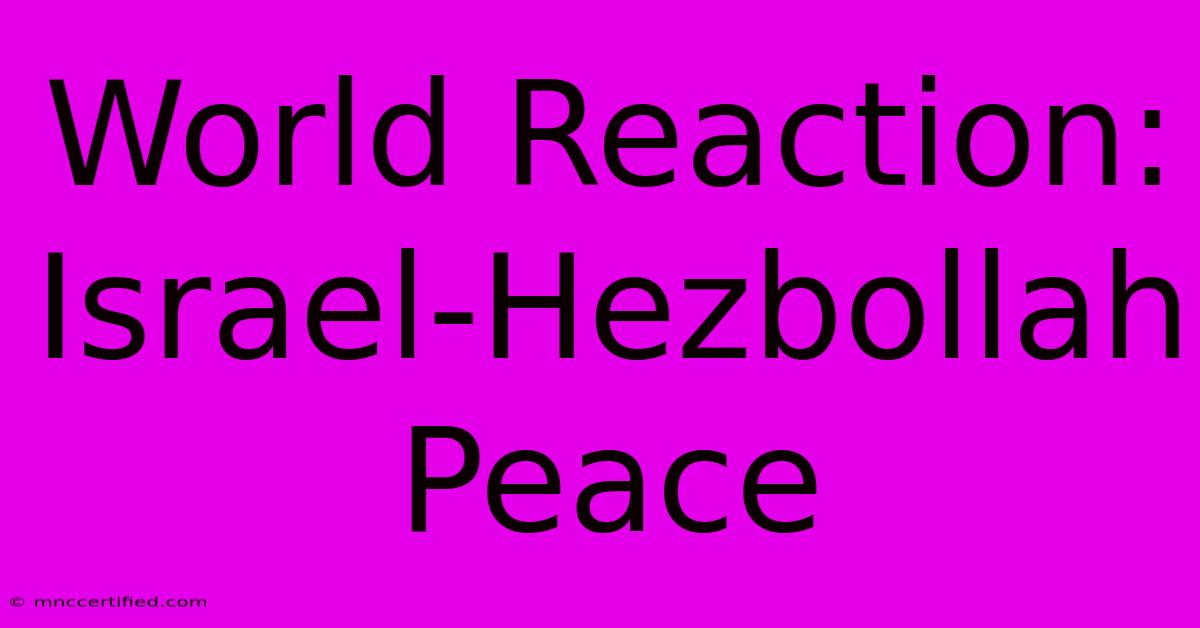World Reaction: Israel-Hezbollah Peace

Table of Contents
World Reaction: A Hypothetical Israel-Hezbollah Peace
The idea of peace between Israel and Hezbollah, a militant Shia Islamist group based in Lebanon, seems almost utopian. Decades of conflict, punctuated by devastating wars, have deeply entrenched animosity on both sides. However, exploring a hypothetical scenario of peace – and the likely global reaction – offers valuable insight into the complexities of the Middle East and the potential for transformative change.
Initial Global Response: Cautious Optimism and Skepticism
An announcement of peace talks, let alone a signed agreement, between Israel and Hezbollah would send shockwaves around the world. The initial reaction would likely be a mixture of cautious optimism and deep skepticism.
Cautious Optimism:
- International Community: Major world powers like the US, Russia, and the European Union would express cautious optimism, emphasizing the need for verification and long-term commitment to the peace process. Statements would likely highlight the potential benefits for regional stability and economic development.
- Regional Allies: Countries aligned with Israel, such as the United States and some Gulf states, would cautiously welcome the news, closely monitoring the process for signs of genuine commitment from Hezbollah. Their support would be contingent on robust security guarantees for Israel.
- Civil Society: Many peace activists and human rights organizations would express strong support, advocating for full implementation of the agreement and addressing the root causes of the conflict.
Deep Skepticism:
- Internal Opposition: Significant internal opposition would likely emerge within both Israel and Lebanon. Hardline factions in both countries would fiercely resist any agreement that compromises their perceived national interests or ideological stances. This opposition could lead to instability and violence.
- Regional Rivals: Countries like Iran (Hezbollah's main backer) and Syria could view a potential agreement with suspicion, potentially destabilizing the regional balance of power and increasing tensions. Their response could range from quiet opposition to active attempts to undermine the peace process.
- Security Concerns: Deep-seated security concerns would remain. Many would question the feasibility of disarming Hezbollah and ensuring lasting peace in the absence of robust international monitoring and enforcement mechanisms. Concerns over Hezbollah's potential to retain clandestine capabilities would persist.
Long-Term Implications and Challenges:
A lasting peace between Israel and Hezbollah would have profound implications, both regionally and globally.
Regional Stability:
- Reduced Conflict: The most immediate benefit would be a significant reduction in armed conflict, potentially leading to a decrease in regional instability and humanitarian crises.
- Economic Development: Peace could unlock substantial economic opportunities in Lebanon and potentially foster greater regional integration and trade.
- Political Transformation: The agreement would likely trigger significant political changes within both Lebanon and Hezbollah, potentially leading to a more moderate political landscape.
Global Impact:
- International Relations: The success of such a peace agreement would be a significant diplomatic achievement, enhancing the credibility of international mediation efforts and potentially inspiring similar breakthroughs in other protracted conflicts.
- Counter-Terrorism: A successful peace process would deal a significant blow to extremist ideologies and potentially weaken the appeal of terrorist groups.
- Regional Cooperation: The agreement could pave the way for wider regional cooperation initiatives, potentially addressing issues like water resources, energy, and environmental protection.
Conclusion: A Long Road Ahead
While an Israel-Hezbollah peace remains a distant prospect, analyzing the potential global reaction highlights the complexity of the issue and the considerable challenges involved. The success of any such agreement would depend on the genuine commitment of all parties, robust international support, and effective mechanisms to address deep-seated security concerns and internal opposition. The path to peace would be long and arduous, but the potential rewards – a more stable and prosperous Middle East – are undeniably significant.

Thank you for visiting our website wich cover about World Reaction: Israel-Hezbollah Peace. We hope the information provided has been useful to you. Feel free to contact us if you have any questions or need further assistance. See you next time and dont miss to bookmark.
Featured Posts
-
Inaccessible Tickets The Oasis Reunion
Nov 28, 2024
-
Trading Post Plymouth Michigan
Nov 28, 2024
-
London Weather Conall Brings Floods
Nov 28, 2024
-
Ni Weather Driving Conditions Warning
Nov 28, 2024
-
New Contract Sought Newark Airport Rally
Nov 28, 2024